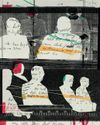
My parents’ apartment had never looked better than on the day it was photographed to sell. As I walked through the rooms, the only thing that seemed out of place was the Statesman, which was the name of the wooden cube that my mother had selected from a catalogue to hold my father’s ashes. (He had been a writer, not a statesman, but somehow the name had stuck.) It wasn’t just that the Statesman looked incongruously modern amid the English antiques and Persian carpets; it was the four plastic bags of gray dust inside. Even though I knew they were proof that my father was gone, I couldn’t shake the feeling that if I just quickened my step I would find him in the next room.
Growing up, I’d always known where in the apartment he would be. The path my father traced through the rooms was highly consistent. He sat on the right side of the sofa, not the left; on the near chair, not the far. He could often be found in the grand canopy bed that he and my mother shared, lying down with the phone, a landline, at his ear. He had memorized hundreds of numbers, and when he left a voice mail he dictated it with warmth and also a certain formality. I can still hear his voice on the machine: “Sage, it’s your father here.”
He was often on the phone with one of the auction houses. He liked to find out what was coming up for sale, hunting for the items that would make each room complete. When a carpet arrived, it would be attached to the parquet floor with hidden Velcro strips at the corners so that they wouldn’t lift up and trip anyone. Certain walls had mirrors, others had paintings. Everything in the apartment had its place, except for a pair of George III “floating chairs,” upholstered in pale-pink silk, which usually flanked the French doors in the dining room but got pulled out for big parties.
This story is from the October 14, 2024 edition of The New Yorker.
Start your 7-day Magzter GOLD free trial to access thousands of curated premium stories, and 9,000+ magazines and newspapers.
Already a subscriber ? Sign In
This story is from the October 14, 2024 edition of The New Yorker.
Start your 7-day Magzter GOLD free trial to access thousands of curated premium stories, and 9,000+ magazines and newspapers.
Already a subscriber? Sign In

GET IT TOGETHER
In the beginning was the mob, and the mob was bad. In Gibbon’s 1776 “Decline and Fall of the Roman Empire,” the Roman mob makes regular appearances, usually at the instigation of a demagogue, loudly demanding to be placated with free food and entertainment (“bread and circuses”), and, though they don’t get to rule, they sometimes get to choose who will.

GAINING CONTROL
The frenemies who fought to bring contraception to this country.

REBELS WITH A CAUSE
In the new FX/Hulu series “Say Nothing,” life as an armed revolutionary during the Troubles has—at least at first—an air of glamour.

AGAINST THE CURRENT
\"Give Me Carmelita Tropicana!,\" at Soho Rep, and \"Gatz,\" at the Public.

METAMORPHOSIS
The director Marielle Heller explores the feral side of child rearing.

THE BIG SPIN
A district attorney's office investigates how its prosecutors picked death-penalty juries.

THIS ELECTION JUST PROVES WHAT I ALREADY BELIEVED
I hate to say I told you so, but here we are. Kamala Harris’s loss will go down in history as a catastrophe that could have easily been avoided if more people had thought whatever I happen to think.

HOLD YOUR TONGUE
Can the world's most populous country protect its languages?

A LONG WAY HOME
Ordinarily, I hate staying at someone's house, but when Hugh and I visited his friend Mary in Maine we had no other choice.

YULE RULES
“Christmas Eve in Miller’s Point.”